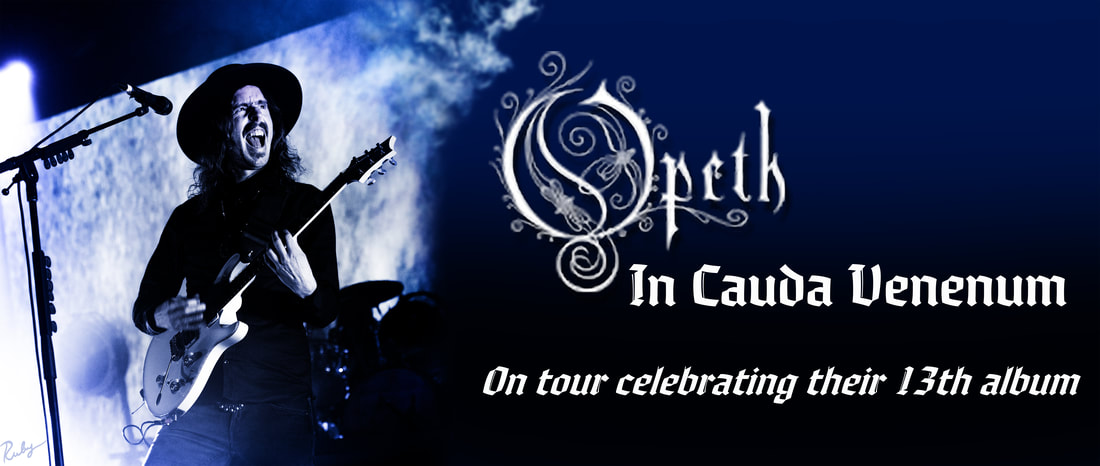Opeth hits the road to with their most important record to date with “In Cauda Venenum”. Certainly, fans and critics will have their opinion, but few records in the Swedes oeuvre are as engaging, delicate, panoramic, intense, and musical as Opeths lucky thirteenth. Sporting a clever Travis Smith cover—replete with inside jokes and a nod to King Diamond—a masterful Park Studios (The Hellacopters, Graveyard) production, Opeths usual five-star musicianship, and lyrics entirely in Swedish, “In Cauda Venenum” raises the bar markedly. While a record in Swedish is a first—theres also an English version—for frontman and founding member Mikael Åkerfeldt, the 10 songs on offer feel and sound completely natural. As if years of listening to and being a fan of Swedish rock and hard rock has paid off. In a way, Opeth have come home. But the Swedish lyrics of the primary edition of “In Cauda Venenum” shouldnt distract from the quality presented in Opeths new songs, the lot of which sneak up and take control after repeated listens. “In Cauda Venenum” is like that, tricky in its complicated simplicity, resourceful in its ability to charm with delightful if wistful melodies. Really, its just Opeth being Opeth.
“This is me,” Åkerfeldt says. “This is Opeth. I think by now fans will recognize—at least I hope they do—my writing style, our sound, what we do as a band. There are a lot of surprises on “In Cauda Venenum”, from the strings and Swedish samples to Fredriks [Åkesson] solos and the Swedish lyrics. But I knew I wanted a Latin title early on. I wanted a Latin title that would work for both versions. I didnt want a Swedish title for the Swedish version and an English title for the English version. Since the death metal days of Opeth, Ive always wanted a Latin title. Nothing ever worked. We had one Latin titled song on the first record though, “Requiem,” the instrumental. Ive always wanted something like that but it turned out harder than I thought when coming up with a title. With Latin, it can mean something really cool but look like shit or be very difficult to read. I couldnt find a source for “In Cauda Venenum”. I thought, “Well, that looks cool.” I remember Travis and I were working on the cover. We had this little insect, a scorpion, with the five heads of the band members. So, when I came across the phrase In Cauda Venenum”, I thought, Well, thats weird. Here we have a scorpion and “In Cauda Venenum” can relate to scorpions. Besides being a cool phrase, it works with the artwork, and the lyrics. In many ways, the stars aligned with the title.”
“This is me,” Åkerfeldt says. “This is Opeth. I think by now fans will recognize—at least I hope they do—my writing style, our sound, what we do as a band. There are a lot of surprises on “In Cauda Venenum”, from the strings and Swedish samples to Fredriks [Åkesson] solos and the Swedish lyrics. But I knew I wanted a Latin title early on. I wanted a Latin title that would work for both versions. I didnt want a Swedish title for the Swedish version and an English title for the English version. Since the death metal days of Opeth, Ive always wanted a Latin title. Nothing ever worked. We had one Latin titled song on the first record though, “Requiem,” the instrumental. Ive always wanted something like that but it turned out harder than I thought when coming up with a title. With Latin, it can mean something really cool but look like shit or be very difficult to read. I couldnt find a source for “In Cauda Venenum”. I thought, “Well, that looks cool.” I remember Travis and I were working on the cover. We had this little insect, a scorpion, with the five heads of the band members. So, when I came across the phrase In Cauda Venenum”, I thought, Well, thats weird. Here we have a scorpion and “In Cauda Venenum” can relate to scorpions. Besides being a cool phrase, it works with the artwork, and the lyrics. In many ways, the stars aligned with the title.”






